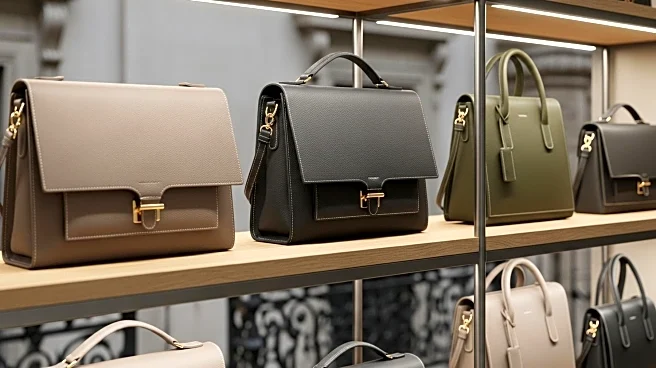What's Happening?
British designer Louise Trotter made her debut for Bottega Veneta in Milan, presenting a collection that emphasizes 'soft functionality.' The collection features structured garments crafted from soft, draped fabrics, including leather coats, wide-shouldered suits, and voluminous fur-style tops. Trotter's designs focus on tailoring and the use of the softest leathers, satin, and wool. A notable aspect of the collection is the large bags made from the brand's iconic 'intrecciato' woven leather, which are carried without logos, highlighting the craftsmanship. Trotter drew inspiration from the early years of Bottega Veneta's founding in 1966 and its expansion into the U.S., reflecting a period of liberation for women.
Why It's Important?
The debut of Louise Trotter at Bottega Veneta marks a significant moment for the brand as it continues to navigate the luxury fashion market. By focusing on craftsmanship and eschewing logos, Trotter aims to appeal to a self-assured clientele that values quality over branding. This approach could strengthen Bottega Veneta's position in the luxury market, particularly as it has shown resilience compared to other brands in the Kering group, such as Gucci. The emphasis on 'soft functionality' and the historical inspiration may attract consumers looking for timeless and versatile fashion pieces.
What's Next?
As Bottega Veneta continues to adapt to the evolving luxury market, the brand may further explore the themes of craftsmanship and understated elegance in future collections. The focus on quality and functionality could set a trend among luxury brands, potentially influencing market dynamics. Additionally, the brand's performance in the coming months will be closely watched to see if Trotter's debut collection resonates with consumers and contributes to sustained sales growth.
Beyond the Headlines
The decision to avoid logos on the bags and focus on craftsmanship reflects a broader cultural shift towards authenticity and individuality in fashion. This move could inspire other luxury brands to reconsider their branding strategies, potentially leading to a more diverse and personalized market. Furthermore, Trotter's debut highlights the increasing influence of female designers in the fashion industry, which may encourage more inclusive and varied perspectives in design.










